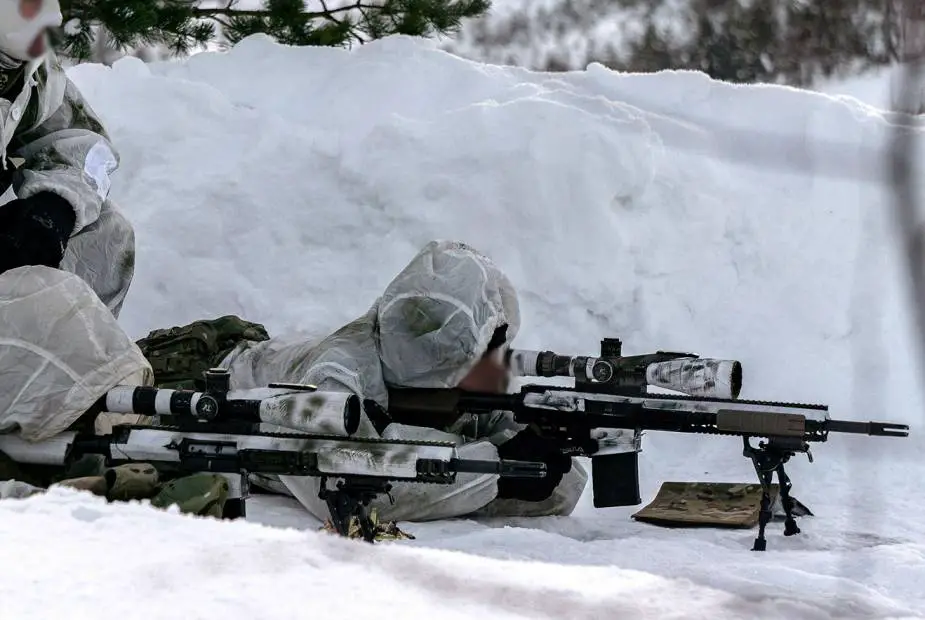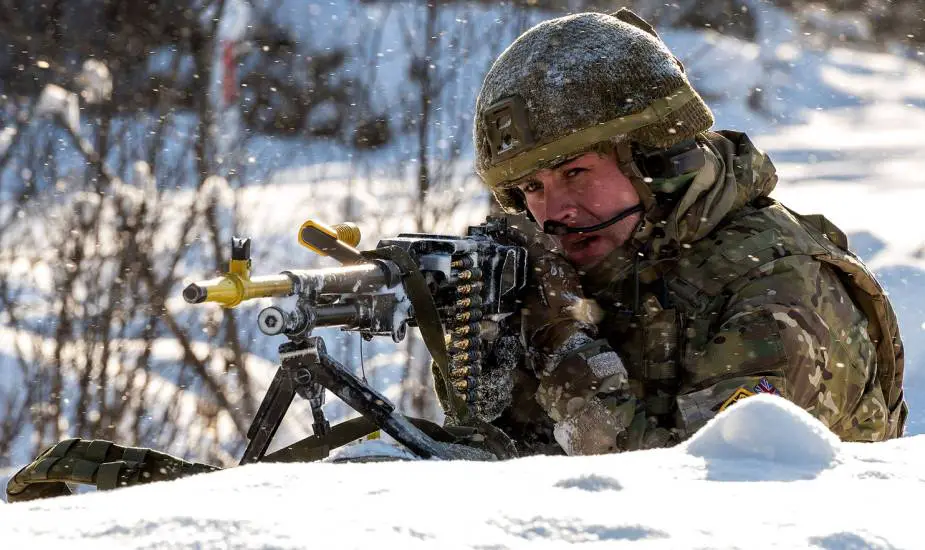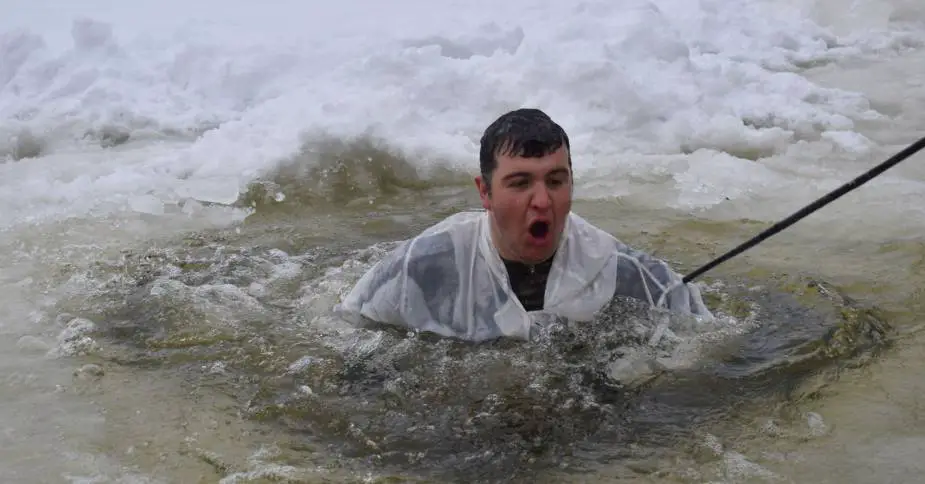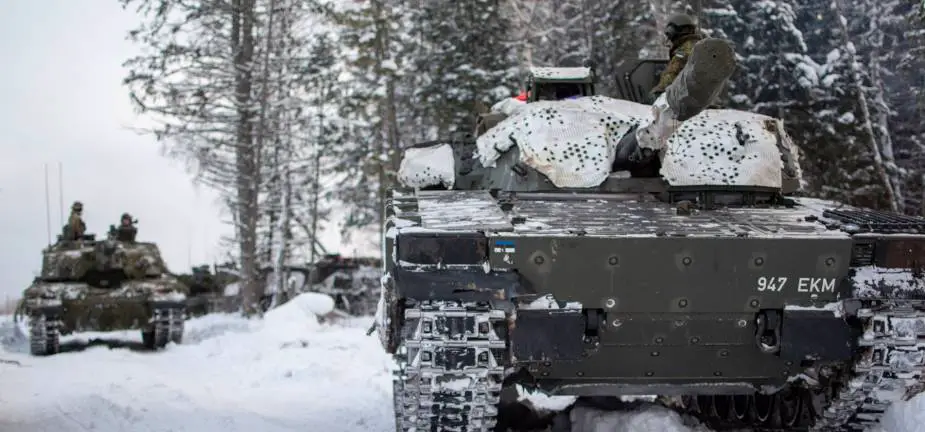Breaking news
Soldiers take on freezing Baltics for NATO winter combat exercise.
Hundreds of soldiers have been undergoing intense training in temperatures as low as minus 20 degrees Celsius in Estonia, as part of the ongoing NATO presence across the Baltics and Poland, the British amy reports on its website. During the two weeks of Exercise Winter Camp, the 5 Rifles-led NATO enhanced Forward Presence (eFP) Battlegroup has trained in deep snow and freezing conditions on the Central Training Area near its base in Tapa.
Follow Army Recognition on Google News at this link

The British infantry companies of 5 Rifles honed their fighting skills in dense snowy forestry with a combination of dismounted close combat live and blank fire tactical training.(Picture source: UK MoD)
To prepare troops for Winter Camp, the Battlegroup took part in a Cold Weather Operator’s Course learning to build shelters, staying out in conditions well below freezing, and surviving jumping into ice cold lakes. Lieutenant Colonel Jim Hadfield, Commanding Officer of the Battlegroup, explained: “As British soldiers, we don’t often soldier in -20 degrees Celsius or this kind of depth of snow. It presents equipment challenges, clothing challenges, as well as different tactics, and the cold weather operators course provides that foundational baseline bit of training, to make sure that we can build upon that and be as good a team as we can be.”

The British infantry companies of 5 Rifles honed their fighting skills in dense snowy forestry with a combination of dismounted close combat live and blank fire tactical training.(Picture source: UK MoD)
The infantry companies of 5 Rifles honed their fighting skills in dense snowy forestry with a combination of dismounted close combat live and blank fire tactical training. "We all joined the infantry for a challenge, and this absolutely qualifies as one," says Major Rob Fellows, Officer Commanding of A Company, 5 Rifles. "Although I have operated in cold conditions before, including in an Afghan winter and done attacks with snow on the ground in the UK, I have never operated in winter conditions as challenging as this, where the snow is as deep as it is, and where the climate is as unforgiving. Therefore, leading a company through a week of high-intensity training in those conditions is really rewarding.

Training to stand icy water (Picture source: UK MoD)
Meanwhile, the Challenger Main Battle tanks of D Squadron Queen’s Royal Hussars tackled the snow and ice of forest tracks as they trained with the Estonian Defence Force’s (EDF) Scouts Battalion. “The Estonians are experienced out here and they know what they are doing with tanks and can guide the commanders to positions they want to utilise us. They can have their CV90s alongside us,” said Trooper Cameron Dixon of D Squadron.
Lt Col Hadfield said: “As part of our training here as the eFP Battlegroup, one of the things that we absolutely have to be is combat credible, and combat credibility for me is the function of three things; one is our integration, and that’s not only our integration into the Estonian national defence plan but our integration across the whole region. It’s also about interoperability [and] our ability to soldier in this environment alongside our Estonian colleagues.’’
All this training was importantly supported by personnel from the Royal Electrical & Mechanical Engineers (REME), the Royal Logistic Corps, 5 Armoured Engineer Squadron part of 22 Engineer Regiment as well as Medics.

Estonian troops in action (Picture source: UK MoD)
Enhanced Forward Presence (eFP)
The 2016 NATO Summit in Warsaw set the conditions for the establishment of an Enhanced Forward Presence (EFP) in Estonia, Latvia, Lithuania and Poland to strengthen Euro-Atlantic security. Operation Cabrit is the name of the UK operational deployment to Estonia where British troops are leading a multinational battlegroup as part of the enhanced Forward Presence (eFP). UK Armed Forces have a leading role in NATO’s eFP in the Baltic States, in order to enhance Euro-Atlantic security, reassure our Allies and deter our adversaries.
The eFP in the Baltic States is a deployment of robust, multinational, combat-ready forces to Estonia, Latvia, Lithuania and Poland, on a persistent, rotational basis. About 900 British personnel rotate on a continuous basis alongside Danish, French, and host nation Estonian forces.


























